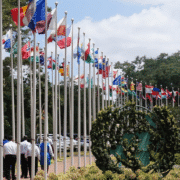3 March 2022
Packaging fruit and vegetables in plastic does not stop food waste. This is the conclusion of the British NGO WRAP (Waste and Resources Action Program) after a technical investigation of five fresh products: broccoli, bananas, apples, cucumbers, and potatoes. The organisation thus negates the often heard mantra of the packaging industry that fruit and vegetables must be wrapped in plastic to avoid food waste.
In Europe, about 40% of all plastic waste comes from food packaging. Some countries are already taking legal action to stem the flow of plastic packaging. France is leading the pack. It banned plastic packaging for fruit and vegetables on 1 January of this year. Spain is following France’s lead in 2023.
In the Netherlands and the United Kingdom, the measures included in the Plastics Pact are voluntary. WRAP, which was one of the initiators of the UK Plastics Pact is now calling for a radical change.
THESE ACTIONS DO HELP REDUCE FOOD WASTE
Plastic packaging appears to have little or no effect on the freshness of the products tested. There are also other reasons to get rid of plastic packaging. Customers should not be dependent on pre-packed quantities such as apples in a bag. Buying more than is strictly necessary is what encourages food waste. Fruit and vegetables should therefore be sold individually. Labels with use by dates should no longer be used for these products. Consumers often throw away foodstuffs after the use by date while they are still safe to eat.
The report makes three main recommendations to supermarkets and producers:
- always sell unpackaged fruit and vegetables unless it can explicitly be proven that plastic packaging does reduce food waste;
- do not use a use by date for uncut fruit and vegetables, unless it can explicitly be proven that a use by date does reduce food waste;
- at home, store fruit and vegetables in the fridge at a temperature below 5 degrees Celsius.
TOWARDS PLASTIC FREE PURCHASES
WRAP had previously issued guidelines for packaging. In light of the investigation results, these are now being thoroughly amended. WRAP works closely with supermarkets, the packaging industry, Defra (Department for Environment, Food and Rural Affairs) and FSA (Food Standards Agency). That this established institution is now calling for the rapid transition to virtually packaging free sales adds extra weight to the issue. However, legal measures, such as those being taken in France, to achieve the desired goal is still not included in WRAP’s recommendations.
STARK CONTRAST
Last October the Centraal Bureau Levensmiddelenhandel (central agency for the trade in foodstuffs, CBL) in the Netherlands published a position paper entitled ‘Duurzaam verpakken’ (sustainable packaging, in Dutch). The report, that emerged from agreements made in relation to the Netherlands Plastic Pact, is in stark contrast to the British study. The starting point of the paper is the assumption that packaging does keep food fresh for longer. It then discusses the principles of the CBL members (supermarkets and food service companies) on reaching a ‘sustainable packaging process’. Then come recommendations: choose the materials carefully to improve the recyclability of the packaging. Getting rid of plastic packaging is barely given as an option, let alone discussed or examined.
Eosta (in Dutch) has demonstrated that, in the Netherlands too, things can be done differently. This wholesaler’s range in fresh organic fruit and vegetables is entirely plastic free. In part this is because it uses natural branding, a laser technique that makes stickers and packaging redundant.
Photo: The vegetable section of a French supermarket after the introduction of the law banning plastic packaging.
You may also be interested in:
Join the refill revolution
Natural Branding – EOSTA
Food waste and plastic waste go hand in hand
Packaging made of seaweed: finally a real solution for the plastic soup!










